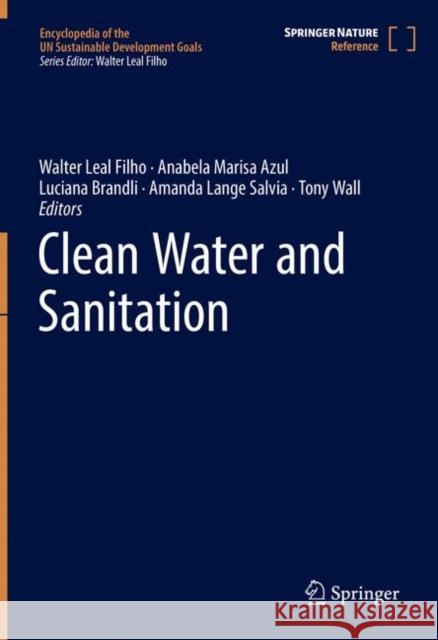Clean Water and Sanitation » książka



Clean Water and Sanitation
ISBN-13: 9783319958453 / Angielski / Twarda / 2022 / 1000 str.
Clean Water and Sanitation
ISBN-13: 9783319958453 / Angielski / Twarda / 2022 / 1000 str.
(netto: 2300,36 VAT: 5%)
Najniższa cena z 30 dni: 1734,98
ok. 22 dni roboczych.
Darmowa dostawa!
Adaptive Water, Sanitation and Hygiene Management: Resilient Governance Systems.- Adequate and Equitable Sanitation in Sri Lanka: Achievements, Issues, and Challenges.- Advanced Technologies in Water Treatment.- Approaches to Water Monitoring.- Capacity Building in Water Resource Management in Developing Countries.- Ceramic Water Filter as a Household Water Treatment System.- Citizen Science and Water Quality Monitoring: Evidence from Dublin and Beyond.- Constitutionality and the Co-management of Water Resources in Cameroon.- Contribution of Citizens to Preserving Local Freshwater Ecosystems.- Dam-Related Displacement and Sustainable Development Goal 6.- Dendrochemistry As Chronological Data Monitoring to Address Mercury Water Contamination.- Earth’s Water Distribution.- Ecosystem Services Approach and Natures Contributions to People (NCP) Help Achieve SDG6.- Effect of Water and Soil Quality on Crop Productivity.- Environmental and Ecological Flows for Sustainability.- Environmental Degradation’s Effect on the Gains Made in SDG6.- Ethics in Water Resource Management: Roles, Frameworks and Principles.- Fecal Sludge Management for Sustainable Cities: Glimpses from Kenya.- Gendered Water, Sanitation, and Hygiene (WASH) Equality: Challenges and Opportunities.- Global Water Resources: Distribution and Demand.- Good Ambient Water Quality.- Groundwater Quality in Arid Environments.
Walter Leal Filho (BSc, PhD, DSc, DPhil, DEd, DL, DLitt) is a Senior Professor and Head of the Research and Transfer Centre "Sustainable Development and Climate Change Management” at Hamburg University of Applied Sciences in Germany, and Chair of Environment and Technology at Manchester Metropolitan University, UK. He is the initiator of the Word Sustainable Development Symposia (WSSD-U) series, and chairs the Inter-University Sustainable Development Research Programme. Professor Leal Filho has written, co-written, edited or co-edited more than 400 publications, including books, book chapters and papers in refereed journals.
Anabela Marisa Azul is a Researcher at the Center for Neuroscience and Cell Biology (CNC) and the Institute for Interdisciplinary Research of the University of Coimbra (UC, Portugal). She holds a Ph.D. in Biological Sciences, specializing in Ecology (2002, UC), and pursued her investigation on biology and ecology of fungi to pinpoint the role of mycorrhizal symbiosis for sustainability of Mediterranean forests under different land use scenarios at the Centre for Functional Ecology (CFE-UC), where she became an Associate Researcher (from 2009 to 2014). At CFE-UC, Marisa Azul developed a holistic approach that combined innovation in food production with sustainable development and public scientific awareness to multiple actors. At CNC, from 2014 on, Marisa Azul focuses her investigation on basic research and participatory research dynamics to pinpoint links between metabolism, health/disease, and sustainability. She has broad academic experience as a researcher working in participatory research and interdisciplinary that link biomedical and life/environmental sciences, social sciences, science education, science communication, and artistic forms. Her research interests also lie in bringing together the academy and social/economical players. She has been successful in attracting national and international funding, coordinating projects, and mentoring young researchers on the topics mentioned. She has co-authored over 40 scientific publications and book chapters, co-edited 4 books on Climate Change Management Series and 1 onWorld Sustainability Series published by Springer, co-authored 4 books for children and 2 comics, and co-produced 1 animation.
1997-2026 DolnySlask.com Agencja Internetowa
KrainaKsiazek.PL - Księgarnia Internetowa









